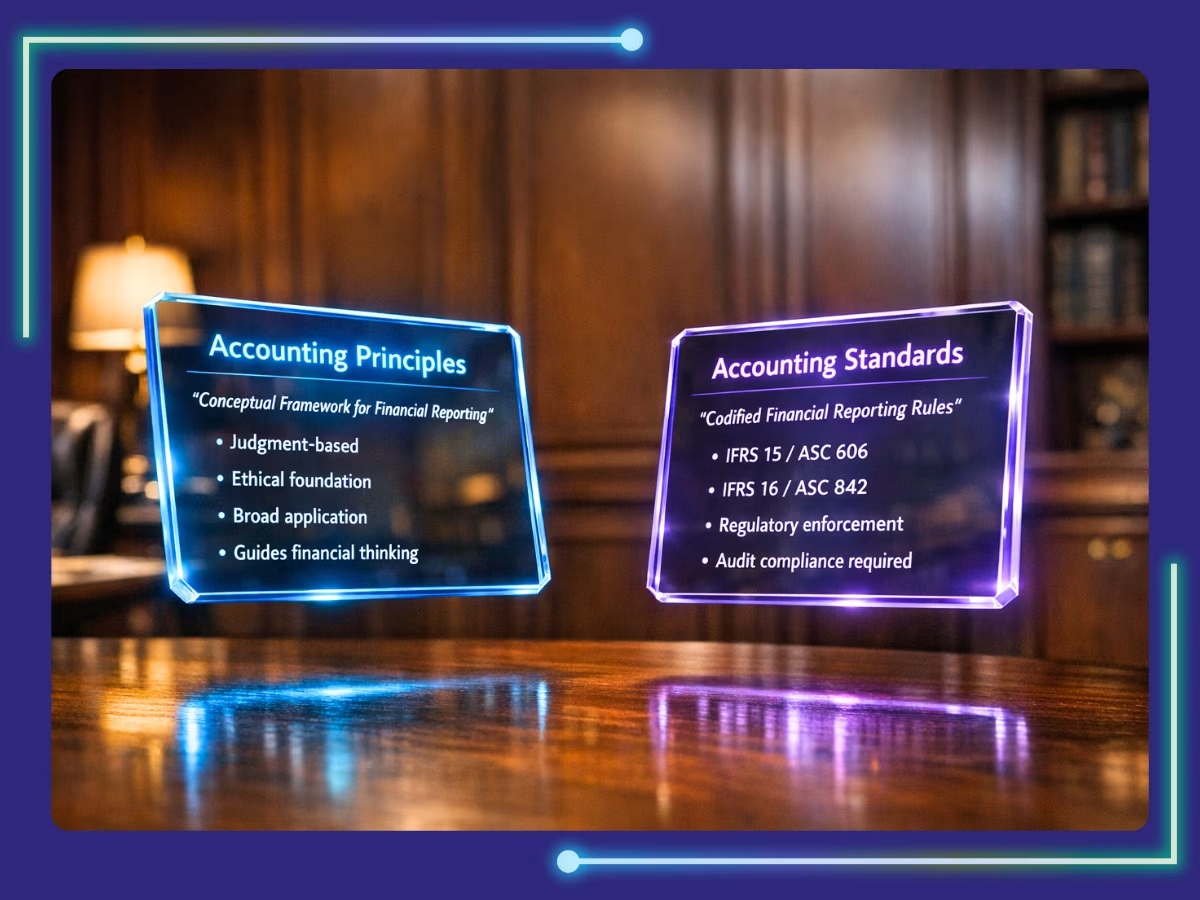Table of Content
Share This Article
- Published: Oct 4, 2025
- Last Updated: Oct 23, 2025
- 🔊 Listen
Quick Reads
- AI is transforming financial management by combining machine speed with human strategic insight.
- AI automates routine accounting tasks, reducing errors and freeing up professionals for advisory roles.
- AI excels in fraud detection and compliance, safeguarding businesses from risk and ensuring regulatory adherence.
- Leading AI accounting software like QuickBooks, Xero, NetSuite, and Microsoft Dynamics enhances automation and collaboration.
- The hybrid model of AI + human expertise transforms outsourcing into a strategic growth enabler.
Artificial Intelligence has significantly shifted the landscape of financial management. Instead of rendering human outsourcing obsolete, AI is creating a powerful new synergy. Modern accounting outsourcing is no longer about moving basic data entry; it’s about connecting your business with AI-powered teams who can manage data at machine speed.
We explore how this partnership, where AI handles the volume and humans provide the strategic value, is becoming the most cost-effective model for achieving accurate, future-proof financial growth.

Outsourcing Done Right!
Get Streamlined Processes, Expert Support, and Financial Clarity.
How AI in accounting has transformed finance over the years?
AI in accounting has transformed the finance function over the years by automating routine tasks, enhancing accuracy, and enabling faster, data-driven decision-making. Initially, AI in accounting focused on bookkeeping, tax preparation, and auditing, reducing manual errors and accelerating transaction processing. Over time, its role expanded to more sophisticated data analysis, fraud detection, compliance monitoring, and real-time financial insights.
Today, AI has become the backbone of modern finance operations, influencing how organisations plan, forecast, and assess performance. Accountants now act as strategic partners who interpret AI-generated insights rather than just record transactions. From predictive analytics that detect potential risks to machine learning models that shape financial strategy, AI continues to redefine what’s possible in financial management, shifting the accountant’s role from reactive reporting to proactive business steering.
What are the Key Benefits of AI in Accounting Outsourcing?
AI is transforming accounting and reshaping the role of outsourced accounting services by automating routine tasks, improving accuracy, and delivering real-time insights. Also, it enables predictive forecasting, enhances compliance, detects fraud, and scales effortlessly, helping businesses focus on analysis and smarter decision-making. Here are the key benefits driving this shift.
Automating Routine Tasks
AI is redefining productivity in accounting by handling repetitive, rule-based work such as data entry, invoice processing, bank reconciliation, and expense categorisation. It pulls information directly from invoices or receipts, processes transactions, and even performs basic compliance checks.
Improved Accuracy and Error Reduction
“Gartner research indicates that effective AI adoption can reduce financial errors by 75%, significantly boosting accuracy and reliability.”
With AI in accounting, human error is significantly reduced. Machine learning algorithms continuously cross-check data, identify discrepancies, and detect incorrect entries before they cause reporting issues. The result is cleaner financial data, consistent reporting, and enhanced reliability, all important for maintaining compliance and building stakeholder trust.
Real-Time Insights and Continuous Monitoring
Unlike traditional bookkeeping cycles, AI in accounting offers continuous oversight. It monitors every transaction in real time, detects irregularities, and updates dashboards automatically. Businesses gain instant access to financial health indicators, enabling faster responses to issues and better-informed strategic decisions. This shift transforms accounting from reactive reporting to proactive financial management.
Predictive Analytics and Forecasting
One of the strongest benefits of AI in accounting is its predictive capability. By analyzing historical data and external market trends, AI accounting software can forecast revenue, cash flow, and expenditure patterns with high precision. This foresight helps businesses anticipate financial challenges, optimize resource allocation, and make smarter, data-driven decisions.
Fraud Detection and Compliance
AI tools can catch unusual transactions, identify duplicate invoices, and spot deviations from normal spending behaviour before they escalate into major issues. Many systems also automate compliance checks, ensuring adherence to tax laws, accounting standards, and audit protocols in real time, reducing both financial and reputational risk.
Cost Efficiency and Scalability
Accounting automation systems handle routine workloads quickly, reducing the need for large teams dedicated to manual tasks. As transaction volumes grow, AI easily scales without compromising speed or accuracy, helping firms expand capacity while maintaining lean, efficient operations.
Faster and Smarter Decision-Making
Through AI in accounting, decision-makers gain immediate access to accurate financial data. AI-driven dashboards visualise trends, detect inefficiencies, and generate actionable insights in real time. This enables leaders to act faster, make informed financial decisions, and maintain agility in competitive markets.

What Are the Best AI Accounting Software?
Modern cloud-based accounting software is transforming finance through automation, real-time insights, and compliance. Software like NetSuite and Dynamics 365 deliver enterprise-grade scalability, while FreshBooks, Wave, QuickBooks, and Xero offer simplicity and seamless collaboration, making accounting faster, smarter, and more connected.
Here are some of the best AI accounting software that are transforming financial management today.
QuickBooks
QuickBooks continues to lead with Intuit Assist, which automates invoicing, sends payment reminders, and categorizes transactions with minimal input. It integrates with payroll, inventory, and tax filing tools, creating a full financial management hub. compliant.
Xero
Xero stands out for automated bank reconciliation, expense tracking, and cash flow forecasting powered by AI. It is cloud-first, mobile-friendly, and connects with hundreds of add-ons to expand functionality as needed.
NetSuite
NetSuite offers AI-driven tools that automate key accounting functions such as lease abstraction compliance, financial consolidation, and reporting. Its predictive analytics assist in managing assets, forecasting cash flow, and ensuring accuracy in period-end closings.
Microsoft Dynamics 365
Dynamics 365 uses AI for predictive cash flow forecasting, anomaly detection, and automated budgeting. It integrates seamlessly with Microsoft Excel, Teams, and Power BI, making it familiar and accessible for finance teams.
Blackline
BlackLine focuses on automating financial close, reconciliation, and compliance monitoring. It provides continuous accounting, real-time exception handling, and audit-ready reports. Enterprises benefit most, as it helps finance teams shorten the month-end process and reduce manual errors.
Wave
Wave delivers AI-powered receipt scanning, expense categorization, and invoicing at no cost. Optional paid services, such as payroll and payment processing, allow businesses to add functionality as they grow.
FreshBooks
FreshBooks provides AI tools for invoicing, expense matching, and time tracking, which help manage projects and billing more effectively. Its client portal and integration with project management apps make it especially useful for service providers.
Hire Outsourced Accounting Experts Who Make AI Work for You
Artificial Intelligence has rewritten the rules of accounting, automating data entry, reconciliations, and report generation, while offering predictive insights that shape strategy in real time. Yet, no algorithm can replace the context, intuition, and decision-making that skilled accountants bring. The real transformation happens when technology amplifies human expertise, does not replace it.
That’s why forward-thinking businesses are turning to accounting outsourcing as the smarter path forward. It’s how they’re streamlining workflows, reducing turnaround times, and gaining real-time visibility into their financial health without inflating overheads.
At Whiz Consulting, we specialize in integrating advanced accounting automation tools with the experience of skilled professionals. From AI-assisted bookkeeping and invoice processing to predictive reporting and compliance monitoring, our accounting services help you stay agile and future-ready. We focus on accuracy, transparency, and speed, so you can focus on strategy, profitability, and growth.
Partner with us today and let’s turn accounting technology into your next competitive advantage.

Get customized plan that supports your growth
Have questions in mind? Find answers here...
AI in accounting is transforming outsourced services by automating repetitive tasks like data entry, invoice processing, and reconciliations. It allows outsourced accounting providers to focus more on analysis, forecasting, and strategic insights instead of manual bookkeeping.
Not yet, and likely not entirely. While AI handles repetitive accounting functions efficiently, human accountants remain essential for interpreting financial data, ensuring compliance, and offering strategic financial guidance.
AI in accounting uses predictive analytics and machine learning to analyze historical data, identify trends, and generate real-time financial forecasts, making reporting far more proactive and precise.
Start by choosing an outsourcing partner experienced in AI accounting tools, standardising data formats, and adopting cloud-based platforms that integrate with AI systems. Training internal teams to interpret AI insights also helps maximise value.
Thousands of business owners trust Whiz to manage their account
Let us take care of your books and make this financial year a good one.
This website uses cookies to improve your experience. You can accept all or reject non-essential cookies.








